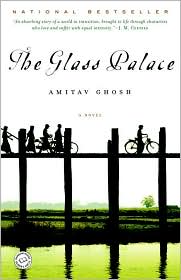I was sure I had heard the name of this writer before and in a positive context, so I decided to give this book a go. The tagline at the front of the book “A magnificent, fascinating, poignant novel of three generations that starts in Mandalay… “ made me think of Rani Manicka’s “The Rice Mother”, one of my favourite books, which was also a factor.
The book is set in India, Malaya and Burma, a country I am curious about (my grandfather was stationed there in WW2 and often mentioned it) but know little about. The story opens with war erupting in Burma against the British over the valued commodity of teak and leading to the deposition of the Burmese royal family.
These events are viewed through the eyes of the 11 year old Rajkumar, a resourceful Bengali orphan stranded in Burma whose own story becomes central to this novel. We follow him as he uses his wit and intuition to become wealthy and find the love of his life, Dolly, a lady in the Burmese court.
At the same time, Ghosh manipulates various strands of the story – the positions of Indians in Burma, the recruitment of Indian officers for the first time by the British, the rise of the Indian independence movement, the invasion of Malaya and Burma by the Japanese and the various political movements in Burma.
This makes for an exciting and engrossing book. The subjects of the book mean that the potential for a boring history lesson abounds, yet Ghosh manages to make the above events interesting and moving by setting Rujkumar’s story, and that of three generations of his family, against this upheaval. In doing so he helps to bring historical events down to a personal level.
Despite this, the novel was not without its flaws. The characters are fascinating and yet I yearned to get under their skin a little more – although we see how events shape them, I never felt that I gained real understanding or insight into any of the intriguing cast of characters. Each is enough on his or her own for a novel and you are left with scores of unsatisfied questions throughout the book (Dolly’s origins, the Collector Sahib’s experiences of racism in Britain, the forgotten Indian’s that died in the Somme and Paschendale, the brutality of Queen Supayalat, the briefly mentioned Aung San and so much more)
Also, the themes and events in this book are wide-ranging and varied, perhaps too much so. A number of stories are woven together, with Rajkumar acting loosely as a common thread through most, but not necessarily all of them. So much is touched on, but none of it explored far enough for my curiosity to be satisfied.
Ghosh clearly writes with confidence and knowledge, but despite this, The Glass Palace is a good novel rather than the great epic it showed promise of becoming at the beginning.
The book is set in India, Malaya and Burma, a country I am curious about (my grandfather was stationed there in WW2 and often mentioned it) but know little about. The story opens with war erupting in Burma against the British over the valued commodity of teak and leading to the deposition of the Burmese royal family.
These events are viewed through the eyes of the 11 year old Rajkumar, a resourceful Bengali orphan stranded in Burma whose own story becomes central to this novel. We follow him as he uses his wit and intuition to become wealthy and find the love of his life, Dolly, a lady in the Burmese court.
At the same time, Ghosh manipulates various strands of the story – the positions of Indians in Burma, the recruitment of Indian officers for the first time by the British, the rise of the Indian independence movement, the invasion of Malaya and Burma by the Japanese and the various political movements in Burma.
This makes for an exciting and engrossing book. The subjects of the book mean that the potential for a boring history lesson abounds, yet Ghosh manages to make the above events interesting and moving by setting Rujkumar’s story, and that of three generations of his family, against this upheaval. In doing so he helps to bring historical events down to a personal level.
Despite this, the novel was not without its flaws. The characters are fascinating and yet I yearned to get under their skin a little more – although we see how events shape them, I never felt that I gained real understanding or insight into any of the intriguing cast of characters. Each is enough on his or her own for a novel and you are left with scores of unsatisfied questions throughout the book (Dolly’s origins, the Collector Sahib’s experiences of racism in Britain, the forgotten Indian’s that died in the Somme and Paschendale, the brutality of Queen Supayalat, the briefly mentioned Aung San and so much more)
Also, the themes and events in this book are wide-ranging and varied, perhaps too much so. A number of stories are woven together, with Rajkumar acting loosely as a common thread through most, but not necessarily all of them. So much is touched on, but none of it explored far enough for my curiosity to be satisfied.
Ghosh clearly writes with confidence and knowledge, but despite this, The Glass Palace is a good novel rather than the great epic it showed promise of becoming at the beginning.
































Assalaamu Alaikum Umm Salihah, I bought this book a few months ago so I thank you for this book review...will definitely give it a read soon...reading Girls of Riyadh presently
ReplyDelete